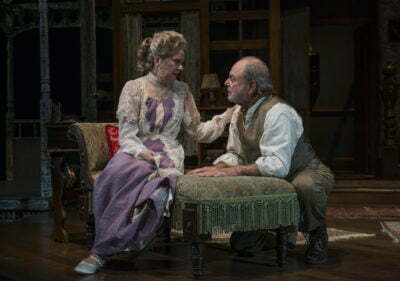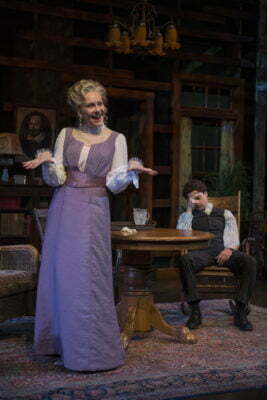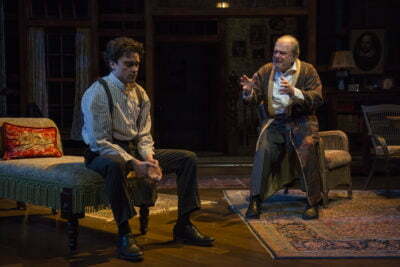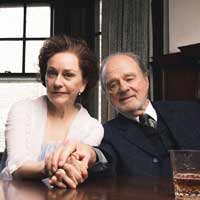Long Day’s Journey into Night
By Eugene O’Neill
Directed by David Auburn
Produced by Court Theatre, Chicago
“I’m sorry for remembering out loud, dear.”
Since its premiere in 1956, three years after its author Eugene O’Neill’s death, Long Day’s Journey into Night has become one of the most frequently imitated plays in the American theatre. Though American dramas had already been depicting middle-class families in crises for a hundred years, O’Neill’s popularized the dark humor and verbal combat used frequently afterward to address topics such as addiction and chronic illness. Now in a production at Court Theatre under the direction of David Auburn, who is most famous for authoring Proof, five brilliant actors demonstrate exactly why Long Day’s Journey is a classic. Seldom have characters seemed so real, but when they do, their conflicts reach across the decades to affect us as deeply as though we were just becoming acquainted with them.

Long Day’s Journey was not O’Neill’s last play (he even wrote a sequel for it), but the conventional historical narrative treats it as the capstone to his artistic development. Having started writing in the early 1910s, O’Neill was a young, but not totally novice theatre practitioner when the industry was devastated by the rise of cinema. Having lost its centuries-old position as the dominant form of popular urban entertainment, it was up to O’Neill and his contemporaries to find a new purpose for theatre. Wanting to take advantage of the stage’s intimacy, O’Neill experimented with expressionism (as shown by Oracle’s recent production of The Hairy Ape), adaptations of Greek tragedy, and masks, and by the 1940s, he had succeeded in transitioning non-musical theatre into a generally small-scale, but more emotionally and intellectually demanding art-form. But as his health was failing, O’Neill drew upon his own family drama to write the largely auto-biographical Long Day’s Journey, which he forbade from being published in his lifetime. Chronicling a day in the life of a morphine-addicted mother and her alcoholic husband and sons, the play would later be praised as one of O’Neill’s greatest triumphs.

The impetus for this particular day in 1912’s events is that younger son Edmund Tyrone (Michael Doonan), who has been ill for some time, is insisting on visiting a doctor. Suspecting that he has tuberculosis, and still seeing this as a fatal condition, the rest of his family is in deep denial, and his mother, Mary (Mary Beth Fisher), returns to the morphine she became addicted to after a quack doctor prescribed it to her during Edmund’s birth. The family blames the father, James (Harris Yulin), as he was always a pathological penny-pincher who choose doctors for their low fees instead of their competence, and they expect him to underfund Edmund’s treatment now. Older brother Jamie (Dan Waller) has mixed feelings about this, since he loves Edmund, but always been jealous of his intellect and ability to self-destruct passively through illness, just as he resented the middle child whose death he purposefully caused, to as much an extent as a seven-year-old is capable of deliberation in such a matter.
For the first thee of the four acts, Mary Beth Fisher is the center of focus on and off-stage as the combative, but pitiful matriarch. Long stretches of the play consist of characters explaining to each other exactly what over the previous decades has spurred their resentments for each other, and few are more eloquent at this than Fisher. Though she tearfully begs his family to overlook her weakness and her humiliation over her use of pain-killers causes her a different kind of agony, she clearly delights in not being held accountable for what she says while high. Most of the put-downs, witty retorts, and devastating summations come from her, though the legitimacy of her complaints keeps her sympathetic to the audience. One of the funniest, but also poignant moments in the show is when she shares a drink with a barely comprehending servant, Cathleen (Alanna Rogers), and winds up contemplating her hands. As long as she has company, Mary is able to maintain her causal demeanor, but when she’s left alone, she can’t distract herself from how disappointed she is in the life she’s made for herself, and how much she’s lost faith in everything.

O’Neill’s stage directions describe James Tyrone, Sr. as sixty-five, but looking ten years younger. Though set designer Jack Magaw followed O’Neill’s description of his family house in Connecticut very faithfully (as did costume designer Melissa Torchia), the casting of Harris Yulin, as Tyrone is one of Auburn’s unique spins on this production. An elderly man who is short-tempered but clearly past the point where he could really fight, Yulin’s Tyrone endures a family he clearly thinks has let him down more than he’s failed them with what he surely considers to be martyr-like patience. Yes, he’s always worried about money, but that’s because he’s the only one whose ever worked (he was a child laborer before becoming an actor). As happy as the rest of the family to bluntly point out other people’s flaws, Tyrone only gradually realizes that the way to forge alliances is to acknowledge mistakes and offer praise. His scene with Edmund is the play’s most heartwarming, and is a stand-out moment for both Yulin and Doonan. It show that even with all the unpleasant history and destructive habits in this house, the family are still people capable of genuine kindness and artistic beauty.

Coming late in the play as it does, the confrontation most likely to be remembered is that between Edmund and Jamie. For most of the play, Waller portrays Jamie as reasonable, but clearly struggling to resist his ill-intentions. His drunken stumble immediately draws full attention after he had been mostly absent for two hours, and having let himself go, his Irish accent has returned in full force. The brother’s exchange captures the entirety of the play’s extremes: there is a blackly comic story about a tryst with a whore which makes everyone sound pathetic, a substance-assisted sentimental declaration, and an expression of pathological cruelty all within the span of a few minutes, and Waller makes all of them fully plausible. Doonan, as the most normal character, for the most part has to be the mature one, but with Waller’s Jamie to play off, he gains a great deal of audience respect for holding his own.
Long Day’s Journey into Night is a show that should be seen, but not casually. At three and a half hours long, it demands not only a great deal of time, but also the willingness of the audience to fully engage. The only part of Auburn’s production which drags is the very beginning. Once the sons figure out that their mother is using drugs again, they turn on their father, and for the remainder of the play, the characters maneuver their way into each other’s sympathy in search of vindication. The squabbling between the Tyrones would not matter if any of them were monsters; we could simply dismiss them as deserving each other. Instead, it is the way their love has been twisted by circumstances and poor decisions that captures our interest, and has maintained it ever since the play’s posthumous publication. Though the American theatre sometimes seems glutted with this play’s imitators which lack its heart or insight, theatre remains vital in large part because Long Day’s Journey set such a high standard. And it’s also surprisingly funny.
Highly Recommended
Jacob Davis
[email protected]
Reviewed March 19, 2016
This show has been Jeff recommended.
For more information, see Long Day’s Journey into Night’s page on Theatre in Chicago.
Playing at Court Theatre, 5535 S Ellis Ave, Chicago. Tickets are $45-65; to order, call 773-753-4472 or visit CourtTheatre.org. Performances are Wednesdays and Thursdays at 7:30 pm, Friday at 8:00 pm, Saturday at 3:00 pm and 8:00 pm, and Sunday at 2:30 pm and 7:30 pm through April 10. Running time is three and a half hours with two intermissions.

